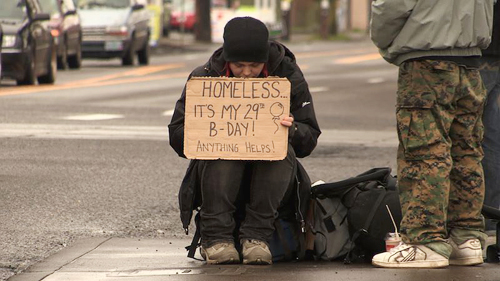This year’s Portland International Film Festival boasts an amazing 93 feature-length films from a total of 44 countries. While the festival offers selections from places like Iran, Senegal, Belgium and even North Korea, the power of Joe and Harry Gantz’s documentary American Winter is that it may hit closer to home than any of the other films.
The Winter of our discontent

This year’s Portland International Film Festival boasts an amazing 93 feature-length films from a total of 44 countries. While the festival offers selections from places like Iran, Senegal, Belgium and even North Korea, the power of Joe and Harry Gantz’s documentary American Winter is that it may hit closer to home than any of the other films.
I mean literally close to home: The film follows eight families from Portland who have struggled with extreme poverty in the aftermath of the recession.
There was a point in time a few years ago, starting around 2008 or 2009, when everyone you met had their own story about the recession. If you or your parents didn’t lose a job, you probably knew someone who did, or someone who couldn’t pay their rent or who might have wondered more than once where their next meal was coming from.
We used to think that worrying about basic needs like food and shelter was reserved for only a certain group of people, but what the Gantz brothers illustrate in American Winter is how devastating the recession has been for people who never imagined they would be poor.
The image of a middle-class mom bursting into tears the first time she visits a food bank is relatable and shocking at the same time: How did this happen in America?
The eight families profiled in the film are all normal and immensely likable people: From John, a dad raising his 10-year-old son, Geral, who has Down syndrome, to Diedre, a single mom and medical assistant who sells scrap metal to survive, to TJ and Tara, who are struggling to keep the lights on after TJ is laid off.
Another couple, Ben and Paula, eloquently describe the death of their dreams for the future. The dream for them, they say, is tomorrow. It’s giving their children dinner. It’s surviving.
You can’t help but be absolutely gutted watching parents desperately trying to provide for their children. Mike and Heather raise their four children in a home without electricity or water for an extended period; the situation is noticed by administrators at school, which leads them to live in constant worry of not only losing their home, but of losing their kids.
American Winter is particularly strong in telling the stories of the children without ever feeling manipulative or maudlin. Ben and Paula’s 8-year-old son Ocean admits he cries sometimes when he overhears his parents saying they skipped dinner so that he could eat.
At 13, TJ and Tara’s son Justin worries every day that he has little to no chance of ever going to college or having any kind of future.
The film presents a number of incredible statistics about poverty in America. An especially eye-opening one is that the top factor in determining how wealthy a child will be is how wealthy his or her parents are. It’s a harrowing dissection of the American Dream.
No matter how much you might wish Justin didn’t have these stresses on him at such a young age, it’s also difficult to argue that he isn’t right to worry. The need to be born into a rich family is as prevalent today as ever before.
The Mitt Romneys of the world think you should get your parents to pay for college, but what if your parents can’t pay for hot water?
I come from a fairly poor background, but at Justin’s age I still imagined I could be famous, travel the world and do pretty much anything I wanted. As a child, it never occurred to me how many dreams are out of reach.
Maybe it is easier for most of us to identify with Justin’s parents and all those in the film who never fathomed how difficult it would be to simply make it from day to day, through economic conditions not of their own choosing and with odds stacked against them.
But the bigger issue is this: There may no longer be future generations of Americans who watch their dreams die, because children will know better than to dream in the first place.
I’m always wary of a film’s potential to preach—even a documentary, and even a documentary I agree with. But American Winter rarely feels political, and it feels no need to beat the audience over the head with a message. The message speaks for itself.
The film does the important work of putting a face on poverty, so that the next time somebody in your Facebook feed says something about lazy people wanting government handouts, you can remember these families and how hard they are trying, how much they are hurting and how much they love each other.
This portrait of a redefined class of poor people, which includes nearly 50 million Americans, is heartbreaking and profound.
The 36th annual Portland International Film Festival, presented by the Northwest Film Center and the Portland Art Museum, runs until Feb. 23 and inhabits seven different venues that reach all corners of the city.
In addition to the wide selection of feature films, they offer five programs of short films, one of which is entirely dedicated to work made in Oregon. You can find schedules and ticket options on the film center’s website.
Whether they are fantastical stories or poignant documentaries, the festival is dedicated to presenting unique visions of life and art from all over the globe.
As American Winter undoubtedly proves, seeing films that connect you with other people’s experiences—no matter how foreign or how familiar—is what makes film truly vital.





